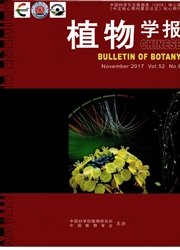

 中文摘要:
中文摘要:
对经低温驯化和未经低温驯化的磷脂酶Dδ(PLDδ)基因敲除突变体与野生型植株进行冻害胁迫处理后,比较2种基因型植株的抗冻性。结果发现,经低温驯化的PLDδ敲除突变体的抗冻性明显低于野生型,而未经低温驯化的PLD礅除突变体与野生型的抗冻性没有显著差异,表明PLDδ参与植物的低温驯化过程。对PLDδ的作用途径进行分析,发现PLDδ在低温驯化过程中不参与抗氧化酶活性的调节,对脯氨酸和可溶性糖的积累起负调节作用,但是参与低温信号转导物质ABA诱导抗冻性的过程。
 英文摘要:
英文摘要:
We compared cold-acclimated and non-acclimated phospholipase D (PLD)δ-knockout and wild-type Arabidopsis thaliana plants for tolerance to freezing.PLDδ-knockout plants showed lower freezing tolerance than did wild-type plants with cold acclimation;without cold acclimation,the two genotypes did not differ in freezing tolerance.Therefore,the PLDδ gene is involved in the process of cold acclimation.The pathways through which PLDδ acts in the process of cold acclimation were then analyzed.During cold acclimation,PLDδ was not involved in the activation of SOD,CAT,or POD anti-oxidative enzymes;it negatively regulated the accumulation of proline and soluble sugar,and mediated the process of freezing resistance induced by the low temperature signaling molecule ABA.
 同期刊论文项目
同期刊论文项目
 同项目期刊论文
同项目期刊论文
 期刊信息
期刊信息
